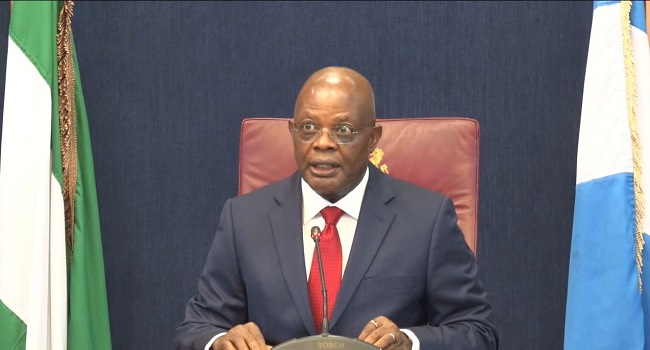The political landscape of Rivers State witnessed a significant transition with the swearing-in of Mrs. Inyingi Brown as the substantive Head of Service, marking a return to normalcy after a period of political upheaval. This pivotal event, overseen by the outgoing Sole Administrator, Ibok-Ete Ibas, just prior to his departure, solidified the administrative structure of the state and paved the way for the resumption of full democratic governance. Brown’s appointment, following her service in an acting capacity after the resignation of the previous Head of Service, George Nwaeke, signaled a commitment to continuity and stability within the state’s administrative machinery. Ibas, in his address, emphasized the importance of loyalty and dedication, urging Brown to extend the same commitment she displayed during his interim administration to the returning Governor Siminalayi Fubara. This call for unwavering support highlighted the need for a unified and collaborative approach to governance as the state moved forward.
Ibas’s tenure as Sole Administrator, though brief, was marked by several key achievements that contributed to stabilizing the state and setting the stage for the return of democratic rule. His administration successfully conducted local government elections, a crucial step in restoring grassroots democratic participation. The reconstitution of statutory boards ensured the proper functioning of key government bodies, while the passage of the state budget by the National Assembly provided the necessary financial framework for governance. These accomplishments, achieved amidst a challenging political climate, demonstrated Ibas’s commitment to fulfilling his mandate and laying a solid foundation for the incoming administration. His farewell speech underscored the importance of responsible governance, emphasizing the need for vigilance, sacrifice, and dialogue to uphold democratic principles and prevent the abuse of power.
The political turmoil that preceded these events stemmed from the declaration of a State of Emergency in Rivers State by President Tinubu in March 2025. This drastic measure, taken in response to months of political instability and security concerns in the oil-rich state, resulted in the suspension of Governor Siminalayi Fubara, Deputy Governor Ngozi Odu, and members of the state House of Assembly for an initial period of six months. The dissolution of existing political structures and the appointment of Ibas as Sole Administrator reflected the gravity of the situation and the need for decisive action to restore order and stability. This period of emergency rule served as a temporary intervention aimed at addressing the underlying issues that threatened the state’s political and security landscape.
The subsequent lifting of the State of Emergency by President Tinubu marked a turning point, signaling the end of the interim administration and paving the way for the reinstatement of the elected government. This decision, which came after months of emergency rule, signified a return to democratic processes and the restoration of full governing authority to the elected officials. The transition back to democratic governance underscored the importance of upholding constitutional principles and ensuring the smooth functioning of democratic institutions. The swearing-in of Mrs. Brown as the substantive Head of Service, occurring just before Ibas’s departure, symbolized the continuity of administrative processes and the commitment to building a stable and effective government.
Ibas’s reflection on his time as Sole Administrator highlighted the challenges and complexities of governance, particularly in a context marked by political turbulence. He characterized governance as a “living process” requiring constant vigilance, sacrifice, and dialogue, emphasizing that the unrestrained exercise of power can undermine institutions and that rivalry without dialogue poses a threat to democracy. This insightful observation underscores the delicate balance required in managing political power and the importance of fostering communication and collaboration to ensure the stability and effectiveness of democratic systems. His administration’s achievements in conducting local government elections, reconstituting statutory boards, and securing the passage of the state budget demonstrated a commitment to fulfilling the core functions of governance despite the challenging circumstances.
The transition from emergency rule back to democratic governance in Rivers State represented a significant milestone in the state’s political journey. The swearing-in of Mrs. Brown as the substantive Head of Service symbolized the restoration of normalcy and the commitment to building a functional and stable administration. The lessons learned from the period of political turmoil and the interim administration’s efforts to stabilize the state served as valuable reminders of the importance of responsible governance, adherence to democratic principles, and the pursuit of dialogue and collaboration in addressing political challenges. The return of elected officials and the resumption of full democratic processes marked a new chapter for Rivers State, offering an opportunity to address the underlying issues that led to the crisis and to build a more resilient and stable political future.














